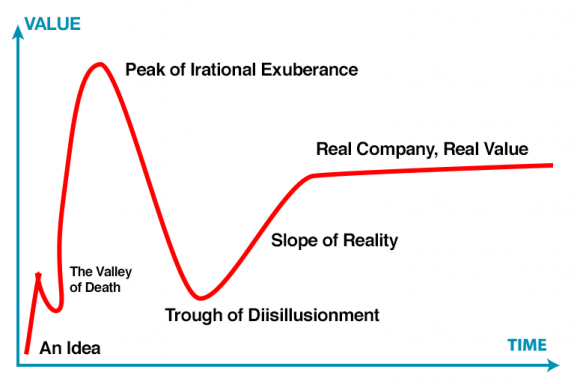
A startup died today. (A thousand other startups died today too, but just as we mourn our own family and friends more than strangers, so we mourn the startups we know more than the masses of others.) In mourning, those of us who knew this company started asking the question, “Why?” Why did this company die?
On the surface, the reason is simple. The company ran out of money. No money, no payroll, no inventory, no customers, and thus no company. The more interesting questions are another layer of questioning. Was this death inevitable? What might have been done differently to save it?
This particular company was in the news just nine months ago, announcing over $1 million in funding. Big, exciting news! Just the type of news the startup media loves to cover.
What those stories never mention is the bargain that comes along with those funds. Investors provide the money with two expectations. First, that the money all be spent within a year, at most 18 months. Second, that the money be spent to reach specific (but rarely published) milestones to justify another round of funding before it runs out. When you subsequently hear that a company is shutting down (or selling itself as a acquihire), you know those milestones were not met.
No matter how many news stories, books, and movies you watch about startups, I doubt you’ll ever hear mention of this bargain. Instead, all these stories make entrepreneurs think that they must have a venture capital investment to have a real company. This is so common I can’t remember the last time I met an entrepreneur who didn’t include at least a round of Angel investment in their pitch.
Some startups have no other choice but to seek such funding. If the business can’t work without $100,000 of equipment, and you don’t have $100,000, then it needs funding. If the business needs a $50,000 mobile app, and you and your co-founders don’t code, its probably not viable to wait until one of you learns Swift. Or sometimes, there is an opportunity that may disappear if you can’t launch and start selling right away, then perhaps you may want to buy yourself some market share.
For every other business, the reality is that funding bargain may not be worth the cost. The reality is that funding is just a shortcut. It provides a way for you to more quickly get a product into the market. More quickly build a team. Potentially more quickly make sales. And potentially grab some early market share. But if any of those potential fail to happen quickly, that funding closes its noose and kills off all future potentials for your company.
My advice to all entrepreneurs is to spend time on at less common question. Can you bootstrap your company? Can you achieve your goal with your savings and a crowdfunding campaign? Can you pre-sell your product to customers before it is built? Can you start by consulting, automating the processes to turn the consulting into a product? Is there any other way to get started without blindly jumping into this bargain trading capital for time?
For more realities of startup funding, check out Luni’s newest book, The Next Step: The realities of funding a startup, now available at Amazon.com















Vehemently disagree with not waiting until the cofounders learn to code. Founders must be able to delegate, but they also must be able to learn practically anything on-the-fly on-demand and under deadline. Otherwise, they are not founder material. Furthermore, non-technical founders have no business creating a technical company. The only shortcut here, is not to receive funding, but to recruit a technical cofounder, alongside achieving at least some degree of technical fluency.
Thanks Adam, but the same logic implies that the founder also needs to be an expert marketer, and salesperson, and bookkeeper, and driver, and sweeper and more.
While a founder needs some knowledge of a wide variety of skills, most of those skills will ultimately be done by people with more skill and more experience than the founder.
With rare exception, it takes a whole team to build a great company. Not everyone on that team needs to hold the title “co-founder”.
I never said expert. Plenty of non-expert founders wrote their MVP and had all of the code eventually replaced. But not knowing how to code before they starting writing code didn’t stop them for a second.
Many investors won’t fund a company that doesn’t have a technical co-founder (YC for example). Co-founder means > 10% equity. IMHO that’s good advice for any investor or program.
Yes, absolutely a founder must be a salesperson, no ifs ands and buts. As good as possible, and that’s probably not good enough. A founder does not have the luxury of staying in their comfort zone and their specialty.
I like the idea of generating revenue through consulting services while you try to build your product. Ideally you can get your consulting clients to pay for your development. You may even get them to go above fees for services and make investments when they see the business results of what you’ve built to help them. Consulting demands limited capital for salaries (especially if the founders are some of the consultants) and almost all outgo is tied directly to revenue generation. Once you have investors, they will have little patience for doing consulting if it distracts from building your product. All that being said, the caveat that you may miss your window with your key resources tied up doing consulting is important to consider. As you say, sometimes you just have to raise the money.
The challenge of the consulting+product path is balancing the time and team between those two distinct halves of efforts within the company. It’s a path I followed at my first startup, with the consulting gigs easily paying to keep the lights on while we churned out multiple products.
It’s all comes down from conflicting interests and agendas between the parties. If entrepreneurs were growing their startups like human babies, they would not fail as frequently. We DON’T fail growing our kids, right? Do we feed them with growth hormones? Do we replace their body parts with bionic counterparts? Do we artificially inject knowledge into their brains? Do we throw at them millions of dollars? There is this false sense of urgency that is vastly promoted by the other side of the ecosystem. They are the ones in urgency to hit the “numbers,” since their fund is to be matured in 10 years, and they need to justify raising their next fund. If you understand how the investment community works, you understand that it is nothing different than betting. The whole system is designed as pyramid to minimize their risk and maximize their ROI overtime. But to the contrary, does the typical entrepreneur give his or her venture an equal opportunity of 10 years or more? In reality, all great companies are built over years, and it is NOT important to be first (but instead be the first still in the game). How many examples one would need to understand that market dominance is NOT guaranteed to be infinite. Even giants like Facebook got terrified by Whatsup and Snapchat, and even the unquestionable dominance of Google search is showing weakness as search is getting distributed onto various mobile platforms. The ground can be shaken under a company of ANY size. The start-up game from the perspective of an entrepreneur should be a sport of endurance where there is basically only one rule you should follow: you don’t quit no matter what. You start with an idea, you build an infrastructure to execute this idea, which may evolve to another idea, and while you leverage your growing infrastructure and knowledge that cannot be acquired or advised by anyone but you, and continue this cycle endlessly. You build a company. You don’t build an exit strategy. And you don’t do this for the money. Entrepreneurship is a career choice not a conditional geek. And lastly, you absolutely don’t get married with liquidation clauses and other founders that do not share the very same philosophy. Welcome to the Organic Startup Manifesto, and happy grinding my fellow entrepreneurs.
Agreed 100%. I find it sad when people are building companies to sell away, it’s like selling their own child.
Tell you this much, if VLocators.com go $1.3 Million we wouldn’t be dead because spending less than $4 a day we’re leaving our competitors in the dust. Some say, why aren’t you making any money and the answer is simple. We’re building awareness and proving our capabilities, not converting with only 1% of the tools needed. Give us $1.3 Million and we’ll have revenue within 6 months and profits within 12 or before. http://www.vlocators.com
[…] in revenues in the first year. Unfortunately, more often than not, those are the only revenues they ever see. But if they do manage to raise a bit more funding from Angels or find the rare path to earn a net […]
Great article! I like the idea of trying to do pre-sales. Do you have articles on that?
Nothing specific on pre-sales. See “The Next Step: A guide to startup sales and marketing” (http://amzn.to/14v59GI) for a ton of tips on how to organize and optimize your sales effort in general.
Thanks! Will go through this today. I think I have access to your book already on your site as I am a new member of the kick program here in Vancouver! I will go through it and gain a bunch of new wisdom! Thanks for putting together something like this!